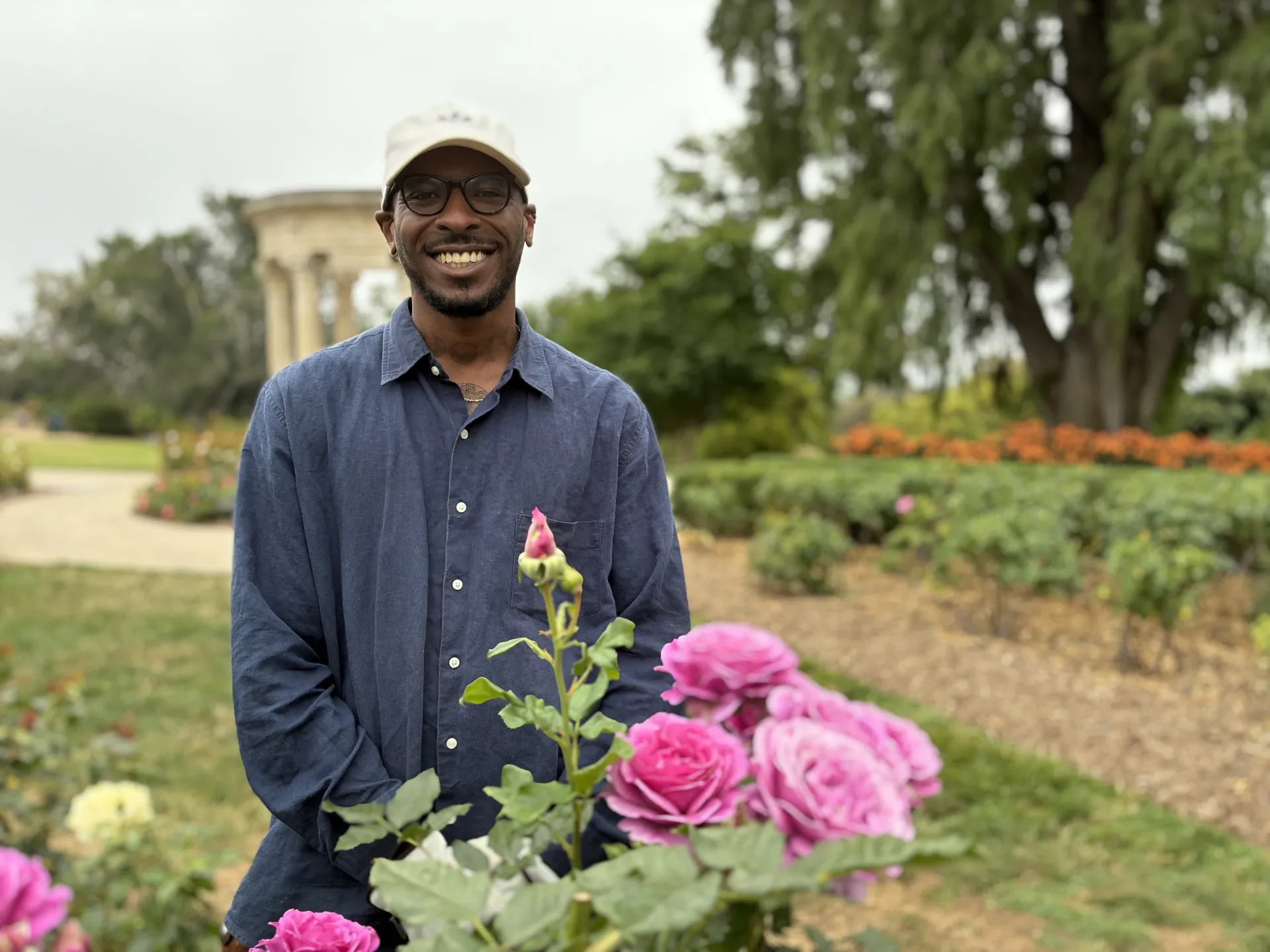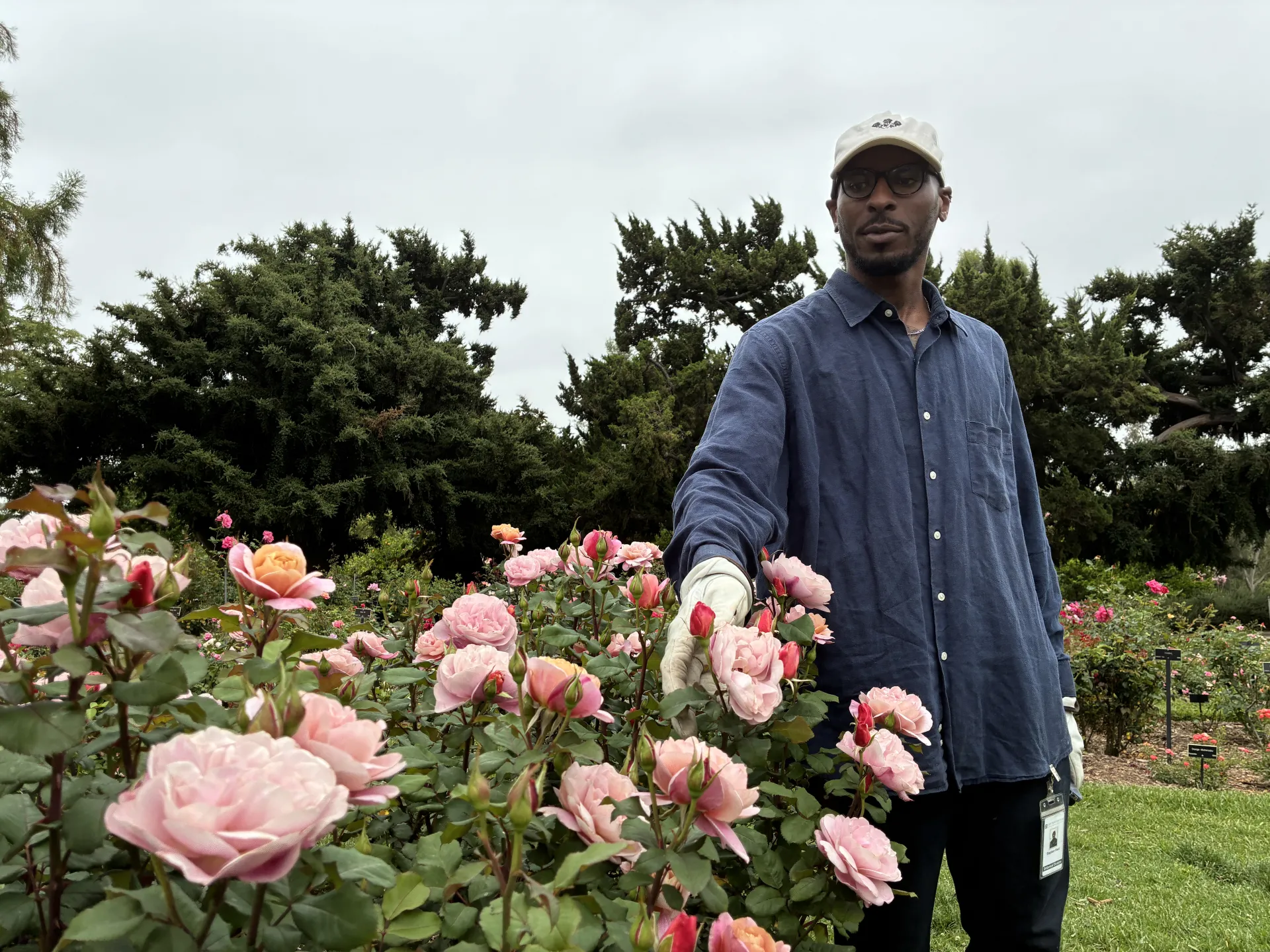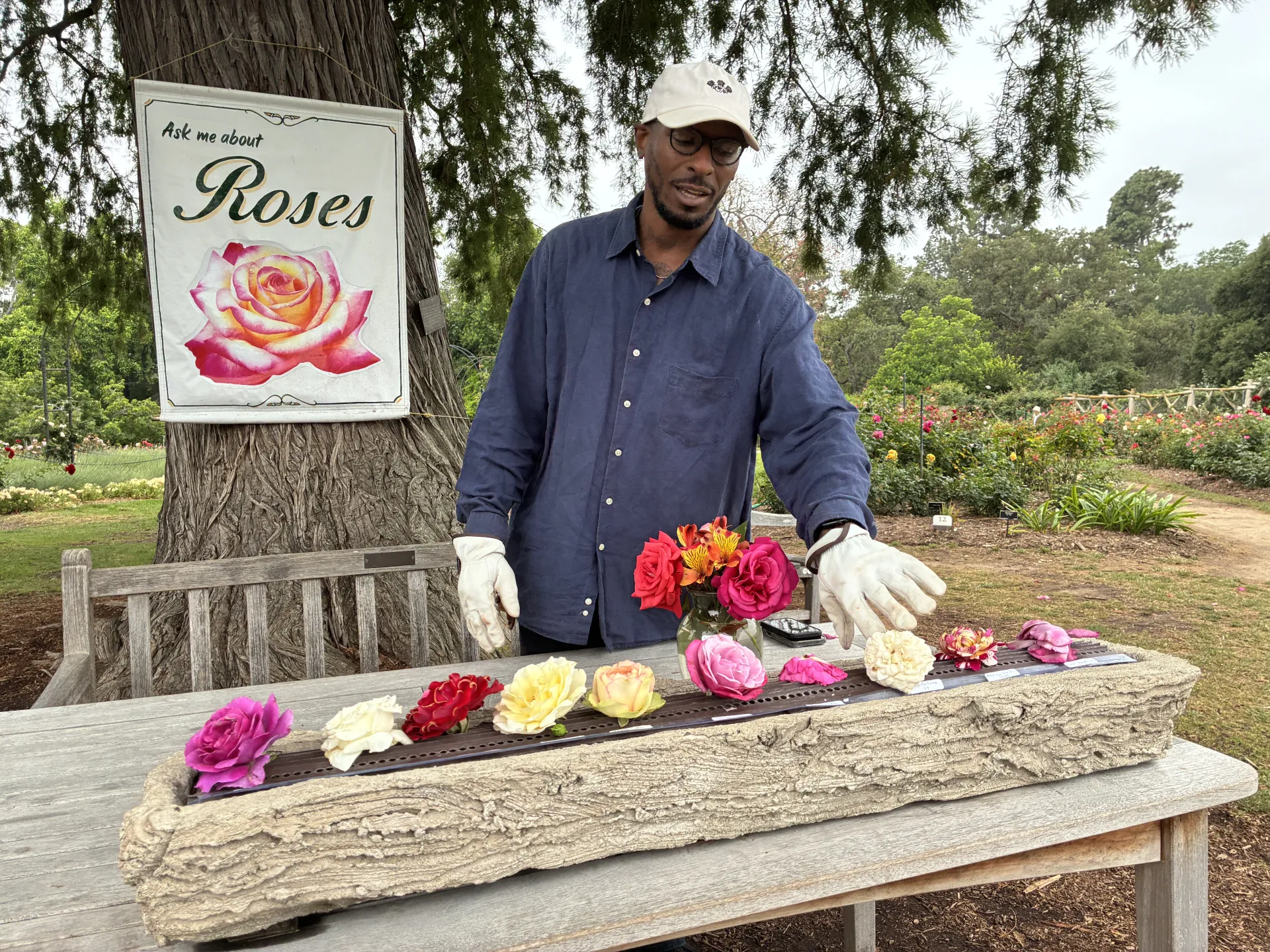Stephen Reid credits UC Master Gardener program for getting his hands dirty, launching horticultural career

On any given day at The Huntington in Pasadena, you’re likely to find Stephen Reid where he’s happiest – shears in hand, balancing on an 8-foot ladder, trimming a trellis full of roses. From up there, he carefully snips the top off each spent bloom, a technique known as “deadheading.”
“It’s my favorite place to be in the morning,” Reid said. “Sometimes I get lost in the roses.”
For two years, Reid has served as assistant curator for the rose portion of the sprawling botanic garden. Between meticulously pruning plants and engaging the hundreds of visitors each day, he still makes time to appreciate individual flowers.
“The best time to smell them is when they’re halfway open.” Reid said, leaning over a particularly fragrant variety called Perfume Factory. “Funny story, this was the first rose I planted in my yard.”
Reid’s path to becoming a professional horticulturist was somewhat unconventional – he doesn’t have a degree in the subject, and his professional experience includes digital advertising and DJing for electronic music shows. But for years, Reid’s free time has been completely dedicated to plants.
“The call to nature just started affecting my work-life balance,” Reid said. “I was always on the search for gardening programs to sharpen my knowledge…just following a hunch.”
A few years ago, Reid’s quest for hands-on training led him to enroll in the Grow L.A. Gardens classes offered by the UC Master Gardener Program of Los Angeles County, which teaches the public to cultivate plants in their own yards and community spaces.
During the class, students tend to an urban garden and go home with seedlings to care for on their own time – an approach that Reid said suited him better than traditional, lecture-based courses.
“Absorbing info just to spit it out on a test and forget it was a waste of time. It never really stuck with me to learn that way,” Reid said. “I needed something where I can just learn it and apply it.”
After completing that multi-week course, Reid was selected to participate in the UC Master Gardener program, a UC Agriculture and Natural Resources program that trains volunteers to provide gardening outreach and education to other budding green thumbs.
Reid credits the UC Master Gardener Program for helping him renovate his own backyard, earning him a profile in the L.A. Times. And while it wasn’t his goal to move up the ranks of the gardening industry, being a UC Master Gardener opened doors for Reid.
“The program set me up professionally and personally,” Reid said. “I knew if I kept following what I was passionate about, it would work out eventually.”

Growing new gardeners
Every UC Master Gardener takes on a long-term group project as part of their course curriculum. Some choose to develop a gardening curriculum for preschoolers. Others choose to rehab an existing community garden. Reid chose to design a prison garden to be tended by incarcerated people.
His role was to research accessibility considerations: What tools are available for prisoners to use? What culturally relevant plants could they grow? What if they have injuries?
“It was just hypothetical,” Reid said. “But it translated directly into what I do now.”
Reid leveraged his experience from the project to launch a job-training program for formerly incarcerated men. He leads them through a series of workshops on landscape design, including sessions hosted at The Huntington, and then connects them with real clients.
This summer, Reid’s students have a job tearing out someone’s lawn. After they’re finished, the space will be filled with native species, and the men will have a new, marketable experience on their resume.
Leading this kind of outreach project is expected of Master Gardeners. Reid estimates he has around a thousand hours he needs to log from the last year alone.
“I don’t feel exhausted because it’s what I want to do,” Reid said.

A rosy disposition
The talent for fostering an accessible garden space has followed Reid to his Huntington career.
He knows rose gardening can seem like some enigmatic art. There’s a perception the plant is reserved for expert growers. On a daily basis, Reid is approached by anxious rose-tenders.
“They’ll immediately start asking about their mom’s roses and how they can take care of them,” Reid said. “They bring questions on pests… mostly, ‘Is my rose gonna die?’’’
Reid pulls on his experience as a UC Master Gardener to alleviate people’s fears. He advises them to just remove pests by hand without using chemicals that could harm the environment.
Beyond that, Reid tries to assure people that roses aren’t as delicate as they may seem.
“I think the best way to kill your fear about roses is by chopping one in half and then waiting six months and seeing what it does,” Reid said. “It’ll be right back to living.”
The durability of roses is part of their appeal for Reid. But looking back on his gardening journey, he wasn’t initially sold on roses. Reid's interest in plants was usually tied to their practical value, and flowers seemed almost pointless.
That changed when Reid experienced his first bloom at The Huntington. He watched people as they wandered through the rows of thousands of rose varieties. He could feel people relaxing.
“I get to see people transform when they walk in,” Reid said. “I understand the medicine of roses now. It makes you feel warm and loved and connected.”
Over the last few years, Reid has noticed a growing number of young people asking about roses. To him, it indicates a shift in the horticultural world.
“There’s a changing of the guard that’s happening right now. The older generation is dying out, or they're retiring, or they're just not able to maintain their gardens,” Reid said.
Reid is up for the responsibility of introducing roses to new generations, carrying on the work of his predecessors. He's still on the hunt for the next learning opportunity, confident that investing in his passion will make any job a bed of roses.

